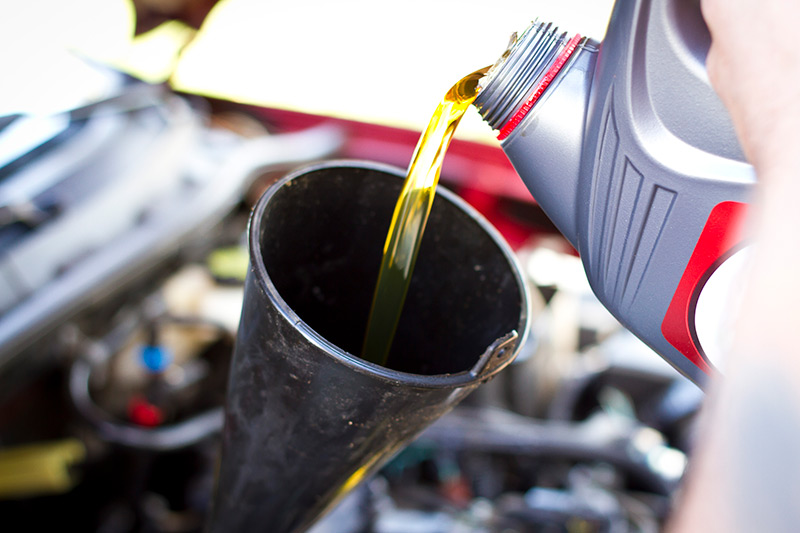When you take your car in to get an oil change, there are typically two options you can consider for your vehicle – conventional or synthetic. If you are not careful, or you take it to the wrong auto repair shop, you may end up with the wrong kind of oil in your car. Newer car models typically use full synthetic oil options while older car models tend to use conventional. At Cassels Garage, we recommend that you maintain one kind of oil in your car and you don’t switch back and forth. As a full-service auto repair shop in Melbourne, FL, we make it our business to keep your car well-maintained. In addition to oil changes, we perform brake checks, tire rotations, transmission repairs and other types of auto repair services. We also offer vehicle fleet maintenance for many Brevard County businesses.
Our team of experienced technicians knows how to keep your vehicle running smoothly. One way to keep your car on the road and your engine in top shape is to make sure you change your oil consistently. The frequency of your oil change will depend on the type of oil you have in your car. If your car is running with synthetic oil, you can wait a lot longer between oil visits. Many people who are short on time, ask about switching to full synthetic. If you research this topic, you will find a lot of different answers and advice. It can be very confusing. Some auto repair technicians say you can convert an old car to synthetic with no problems or that you can even switch back and forth. Some use a blended variety of both synthetic and conventional. This is all a subject of great debate.
You know the old adage, “If it’s not broken, don’t fix it.” Well, at Cassel’s Garage we feel that way about the type of oil you use in your car. Think of it this way. Oil is a type fuel, much like the food you eat. When you change your diet, it could be good, or you could have unintended stomach issues. Unforeseen problems could arise. The question is, do you really want to repair your car because you tried something new? If you think changing your car over from conventional to synthetic will make your engine perform better – think again. Or, if synthetic oil is too expensive for your budget this month and you want to spend a little less on the conventional option, it could cost you more in the long haul.
Let’s take a closer look at the role of oil in your car and difference between synthetic and regular oil.
Why does my car need oil?
When your engine is running, it generates heat and develops friction. To minimize the friction, the engine requires oil to lubricate the engine. It also enhances the fuel efficiency of your car. The better you maintain your car with oil changes at the right intervals, the better your gas mileage will be.
A comparison of synthetic and conventional oil
Both synthetic oil and regular oil are derived from crude oil out of the ground. Synthetic oil is distilled, refined and then purified. It goes through a much greater purification process than conventional oil. New cars are primarily moving to synthetic oil, while older models tend to use regular (conventional) oil. When conventional oil burns, it releases more toxic gases than the synthetic “man-made” alternative, which causes environmental pollution.
The upside of synthetic oil
There are many benefits to using synthetic oil. It’s cleaner, performs better and minimizes the impact on the environment. Synthetic oil is very smooth and consistent. It can withstand extremely high and low temperatures much more efficiently than regular oil. However, when it comes time for an oil change, synthetic oil is considerably more expensive. It can cost up to three times more than regular oil. With synthetic oil, you don’t need to change your oil as frequently as regular oil, but the price difference doesn’t fully compensate for the extra mileage you can get with synthetic oil.
Why should I stick to regular oil?
Ok, so now that you know the benefits of synthetic oil and you don’t even mind the higher price point, you may be asking, why wouldn’t I use full synthetic oil in my car? We are glad you asked that question! Engines, in general, have a lot of irregularities. Regular oil, a natural resource from the earth, is comprised non-uniform sized molecules. The inconsistently sized molecules can help smooth rough surfaces of an engine quickly and effectively. If your engine has some “weak” spots on its seals, a good clean synthetic oil will find those spots and can penetrate those areas, causing some issues. Synthetic oils molecular make-up is 100% consistent. If you have an older car that has been running just fine with regular oil, changing over to synthetic, may reveal those imperfections. Remember what we said earlier, if it’s not broken, don’t fix it.
The Verdict: Keep using the same kind of oil
At Cassels Garage, our answer is simple. Maintain your car with the oil that your engine was designed to use. In simplest terms, if your car has always used regular oil, maintain regular oil. If your car is new and has always used synthetic, maintain synthetic.





